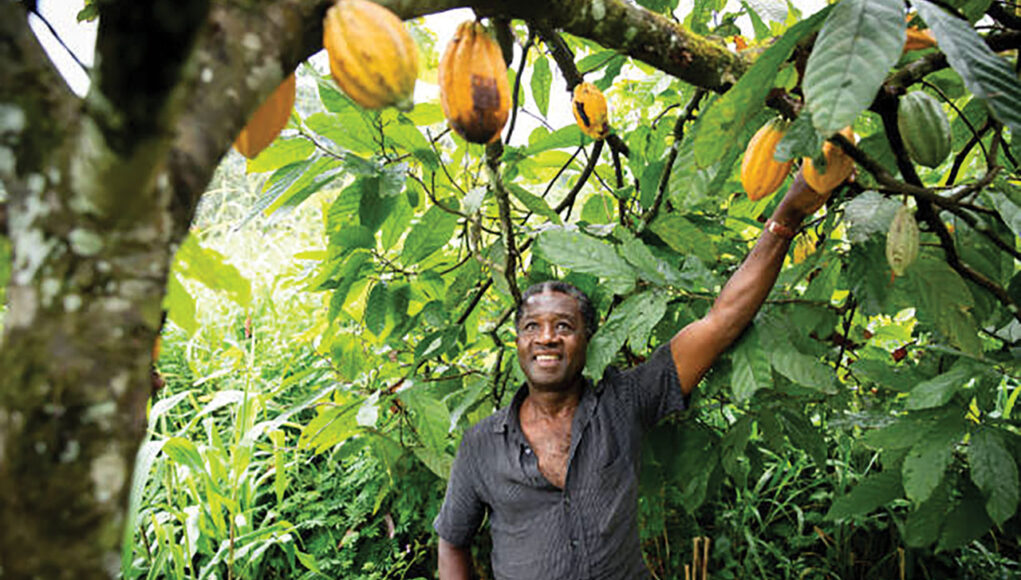
Amid staggering revelation that Nigeria is losing over $2 billion yearly to the under-explored value chain opportunities within global cocoa industry, the farmers are currently smiling to the bank as price of the commodity has appreciated significantly at the international market.
At the International Cocoa and Chocolate Forum (ICCF 2024 – Nigeria), it was learnt that the processing capacity in the country is about 200,000 metric tonnes to convert cocoa to butter, liquor and cake/powder, but Nigeria is operating 30 per cent capacity, because the cocoa industry and the domestic market are not properly structured in a manner that will attract the right investments to compete with western offerings.
But the last three months has seen a sudden change of fortune for the farmers, as the cocoa pricing system is currently in their favour.
As at the weekend, The Guardian authoritatively gathered that a tonne of cocoa, sold at the rate of N4 million few months ago, has increased to N13m per tonne, to the delight of the farmers.
The National President, Cocoa Farmers Association of Nigeria (CFAN), Comrade Adeola Adegoke, who confirmed this, said the current pricing system owed much to the skyrocketing prices of cocoa beans at the international markets, coupled with the fact that Nigeria is currently running a deregulated cocoa economy after the abolition of the cocoa board in 1986.
“Currently, we are not envying our counterparts – cocoa farmers in Ghana and Cote d’Ivoire owing to the system of their cocoa economy, which does not give them the opportunity to enjoy the present surge in cocoa prices, as a result of the future cocoa contract being executed by their respective cocoa boards.
“In fact, we were reliably informed that the price the two respective giant cocoa origin countries are paying their farmers were the prices of cocoa as at April, 2023 that was around $2,700 per tonne. Let’s forget the new increment in cocoa prices in Cote d’Ivoire and Ghana of recent where it was done at 50 per cent at both countries just two weeks ago and last week, respectively,” he said.
Currently, Nigeria ranks fourth in cocoa production behind Cote d’Ivoire, Ghana and Indonesia in the world, with a production capacity of 340,163 tonnes, yet it has failed to tap into the potential of the product’s value chain.
Adegoke said one of the ways to address the problem of under-explored value chain opportunities and other challenges bedeviling the industry from competing favourably with its counterparts, is to firm the control of the cocoa economy to increase the production and productivity of smallholder cocoa farmers’ holdings through the provisions of subsidised farm inputs, credit facility, capacity building among other, to improve their livelihoods.
“We must start to regulate and promote the Nigerian cocoa economy through the National Cocoa Management Committee (NCMC) where more investment into the sector will be guaranteed if the committee can achieve stable regulatory framework that controls quality, smuggling, pesticides control, extension management, research and development, traceability, child labor eradication, deforestation control and National Cocoa Plan implementation.
“The NCMC must not get involved in buying and selling of cocoa beans except cocoa beans stabilisation support funding in future when necessary, especially when cocoa price nosedived downward beyond cocoa farmers economic capacity, as being done in other developed countries on other commodities.”
A cocoa merchant based in Wasimi, Ogun State, Mr. Ramoni Ajadi, confirmed that Nigeria has better opportunities to surpass its rivals in the continent, considering the downward slide of their cocoa production, majorly owing to pest and disease, climate change, smuggling, miners activities, land degradation, unfavorable cocoa economy governance and others.
“With the Nigeria youth population in cocoa industry, and the favorable cocoa governance, as far as the recent cocoa prices benefit to the Nigerian cocoa farmers are concerned, the future of the sector in the country will further be brightened with the intervention of the full exercise of the regulatory powers of the industry vested in the hands of NCMC dominated by the private stakeholders in the industry.”
On his part, the Founder of International Cocoa Diplomacy (ICD), the Oloni of Eti-Oni, Osun State, Oba Dokun Thompson, expressed optimism that Nigeria is capable of increasing its production to about 1.5 million tonnes per year, consume most of it and also supply the rest of the continent before exporting to Europe or America.
“There are several challenges and several factors. The first is the culture of cocoa; the second is the need to understand the technology that the produce requires to turn it around for the purpose; thirdly, because we don’t understand the technology required to turn it around for that purpose; and fourthly, funding.”




















































